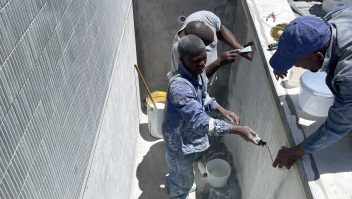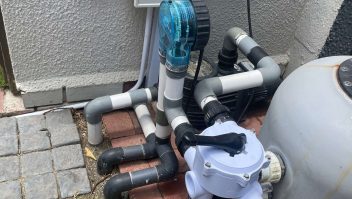Keeping a pool comfortably warm in the Western Cape isn’t just luxury — it’s about more swimming months, better return on pool renovations, and protecting your investment (less algae, better chemical stability). In this guide we explain the four most common heating options available locally, realistic cost ranges in South African Rand (ZAR), running costs, pros and cons, installation notes, and practical tips so you (or your clients) can choose the right solution.
Quick summary (pick one):
• Lowest ongoing cost: Solar collector panels + solar blanket.
• Best all-rounder for year-round warmth: Inverter pool heat pump.
• Fastest heat (short term): Gas heaters (rare for local residential use).
• Cheapest upfront: Solar blanket alone (but limited heating power).
1) Solar pool heating panels (roof or ground-mounted collectors)
How it works: Pool water is pumped through black polymer/flat-plate collectors mounted on the roof; sun heats water before it returns to the pool.
Pros
- Very low running cost after install (sunlight is free).
- Durable — many panels last 15–25 years.
- Works well in Cape Town climate in summer and shoulder seasons.
Cons
- Performance depends on sunshine and panel area — cloudy or windy days reduce output.
- Requires roof/space and plumbing plumbing run.
- May need more panels for larger pools.
Local cost indicators (ZAR):
- DIY panels (single panel retail): ~R700–R900 each (single-panel price seen locally).
- Installed system (typical domestic pool): R8,000–R35,000+ depending on number of panels, roof work and plumbing. (Get a tailored quote.)
Running cost estimate: mostly pump power — typically R30–R80/month extra if you use existing pump with a small extra circulation time.
Best for: Pools used mainly in summer and shoulder seasons where minimal electricity running costs are desired.
2) Inverter pool heat pumps (air-source heat pumps)
How it works: A heat pump extracts heat from air and transfers it into pool water. Inverter models modulate power and are much more efficient.
Pros
- Heats reliably even in cooler weather — ideal for extending season.
- Very efficient (COP often 4–6), so lower electricity per kWh of heat vs resistive heaters.
- Quiet inverter models available.
Cons
- Higher upfront cost than a solar blanket (but lower running cost than electric element heaters).
- Performance drops in very cold conditions (less of an issue in Western Cape mild winters).
- Needs proper placement and periodic maintenance.
Local cost indicators (ZAR):
- Unit prices for residential inverter heat pumps locally: R17,000–R25,000+ depending on kW capacity and brand; installation extra.
Running cost estimate: variable by pool size & use; some local estimates place monthly running from R800–R2,000/month depending on target temperature, local electricity tariffs and hours of operation (can be substantially reduced if paired with solar PV).
Best for: Owners who want consistent year-round temperatures and are prepared to invest up front.
3) Solar blankets (bubble covers) — the low-tech efficiency booster
How it works: A bubble-style cover blocks evaporative heat loss and captures solar gain, effectively adding several degrees to usable water temp without any energy input.
Pros
- Cheapest upfront.
- Dramatically reduces heat loss and chemical evaporation (saves water and chemicals).
- Works with any heating source to reduce run-time.
Cons
- Aesthetics and manual handling (though reels/motors help).
- Wear & tear; replace every few years.
Local cost: wide range depending on size & thickness — from a few hundred to several thousand rand; reels/motors extra. (Ask Pools Reno to size and quote.)
Best for: Any pool owner who wants to reduce running costs — always use a cover with any heater.
4) Gas or electric element heaters
How it works: Gas (propane/natural gas) or electric resistance heaters instant-heat the water.
Pros
- Fast warm-up; good for spas or occasional short use.
Cons
- High running cost for long durations — not cost-effective for regular pool heating in SA.
- Gas installations require careful safety checks.
Best for: Commercial pools or occasional use where instant heat is required.
Hybrid approach (smart & efficient): combine systems
Most savvy Cape Town owners go hybrid:
- Solar collectors for free daytime heat + inverter heat pump for evening/shoulder-season top-ups + solar blanket to keep that heat in.
- Pairing a heat pump with your home solar PV significantly reduces Eskom electricity exposure and lowers monthly running cost.
Practical sizing & selection tips
- Calculating heat needs: pool surface area, desired temperature rise, local wind exposure and insulation (covers) determine system size.
- Oversize solar or heat pump slightly for beds of wind-exposed pools.
- Always use a solar blanket — it reduces required heat input by up to 50% or more in many cases (practical savings depend on climate and use).
- Choose inverter heat pumps when possible — they modulate and are far more efficient than on/off units.
Typical lifetime & maintenance
- Solar panels: 15–25 years (subject to quality and UV exposure).
- Heat pumps: 8–15 years with proper care.
- Solar blankets: 2–6 years depending on thickness & sunlight exposure.
Maintenance: annual service for heat pumps (check refrigerant/airflow), periodic cleaning of solar panels/collectors, and replace or repair blanket if torn.
Rough payback example
- Small suburban pool installs a R20,000 heat pump and uses it 4 months a year actively; energy savings vs electric elements may recoup cost in ~3–6 years depending on usage and tariffs. (Actual ROI depends heavily on hours used, chosen temperature and electricity price.)
Local suppliers & what to ask for in your quote
Ask suppliers for:
- Sizing based on pool surface area & expected temperature rise.
- Full installed price (unit + labour + electrical upgrades).
- Running cost estimates in ZAR for your pool size.
- Warranty & service options (cell replacements for salt systems, heat pump warranties).
Examples of local suppliers and product pages show a range of panels and heat pump models available in Cape Town.
Call to action (CTA)
Thinking about heating your pool? Pools Reno can visit, measure and recommend the most cost-effective system for your pool in Cape Town and the Western Cape. We provide free on-site quotes, installation, and aftercare plans.
Learn more about our services
- Pools Reno — Pool Repairs & Equipment (service page).
- Pools Reno — Chlorinators & Salt Systems.
- Pools Reno Blog: How to choose the right size heat pump for your pool (calculator + downloadable worksheet)
FAQ
Q: Which is cheaper — solar collectors or a heat pump?
A: Solar has the lowest running cost but depends on sunlight; heat pumps cost more up front but give reliable year-round temps and work well with a solar blanket and/or solar PV.
Q: How much will a heat pump add to my electricity bill?
A: It varies — local estimates show R800–R2,000/month depending on usage, pool size and set temp; pairing with solar PV reduces this considerably.
Q: Can I retrofit a solar system on any pool?
A: Most pools can be retrofitted provided you have roof or ground space for panels and access for plumbing. An on-site assessment is recommended.
Q: Do I still need a chlorinator if I heat my pool?
A: Yes — heating doesn’t replace sanitation. If you have a salt system or chlorine feeder, keep chemistry balanced.
Sources & further reading (local)
- “Is Solar Pool Heating Worth It? Cost vs Savings in Cape Town” — Cape-Pools. cape-pools.co.za
- Solar panels and DIY panel prices — SolarTemp product pages. solartemp.co.za
- Local inverter heat pump listings & prices (Solartemp / ITS) — product pages. solartemp.co.zaUtilityPal
- Pairing heat pumps with solar PV to lower running costs — AC Direct article. AC Direct
- General 2025 pool trends showing interest in sustainability & heating upgrades. Guncast Ltd



